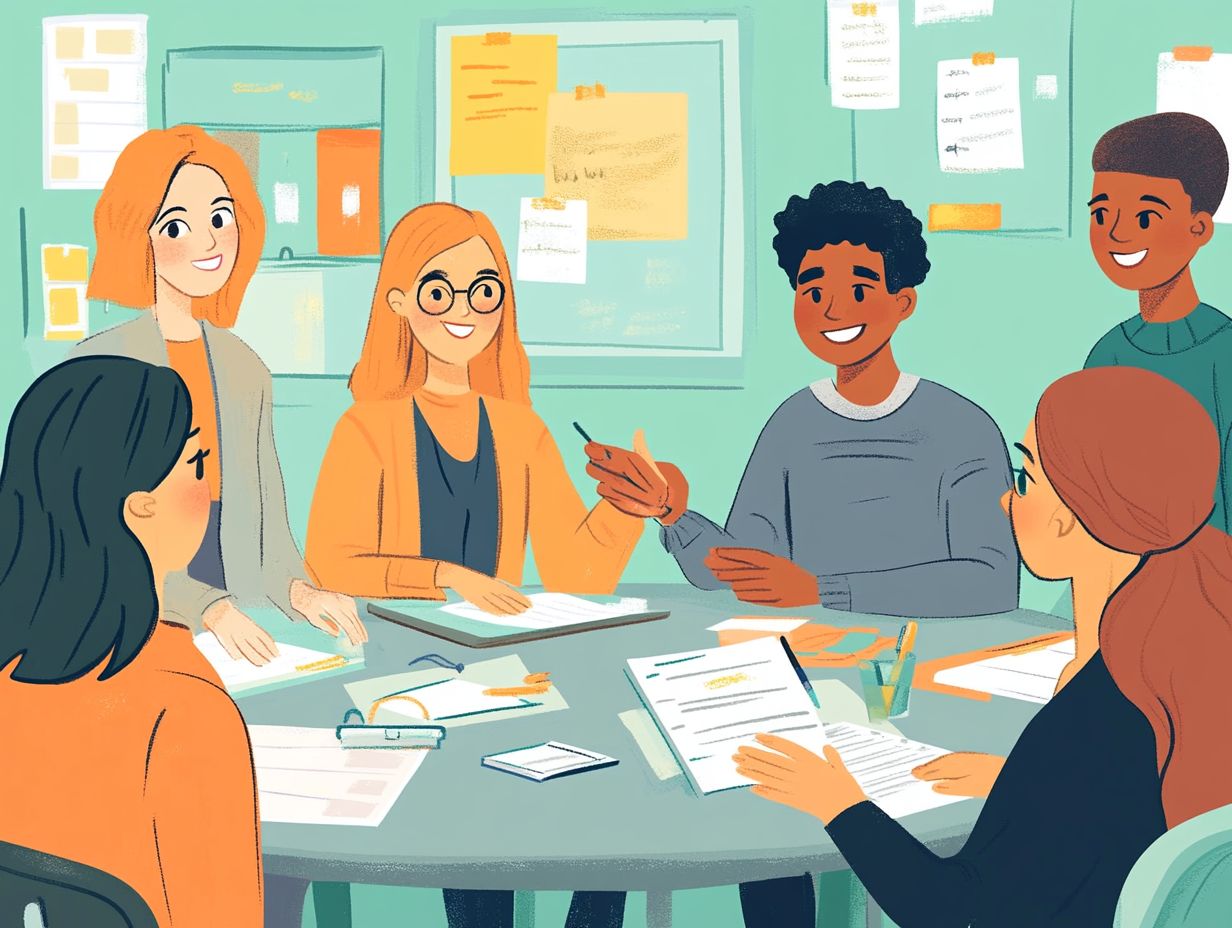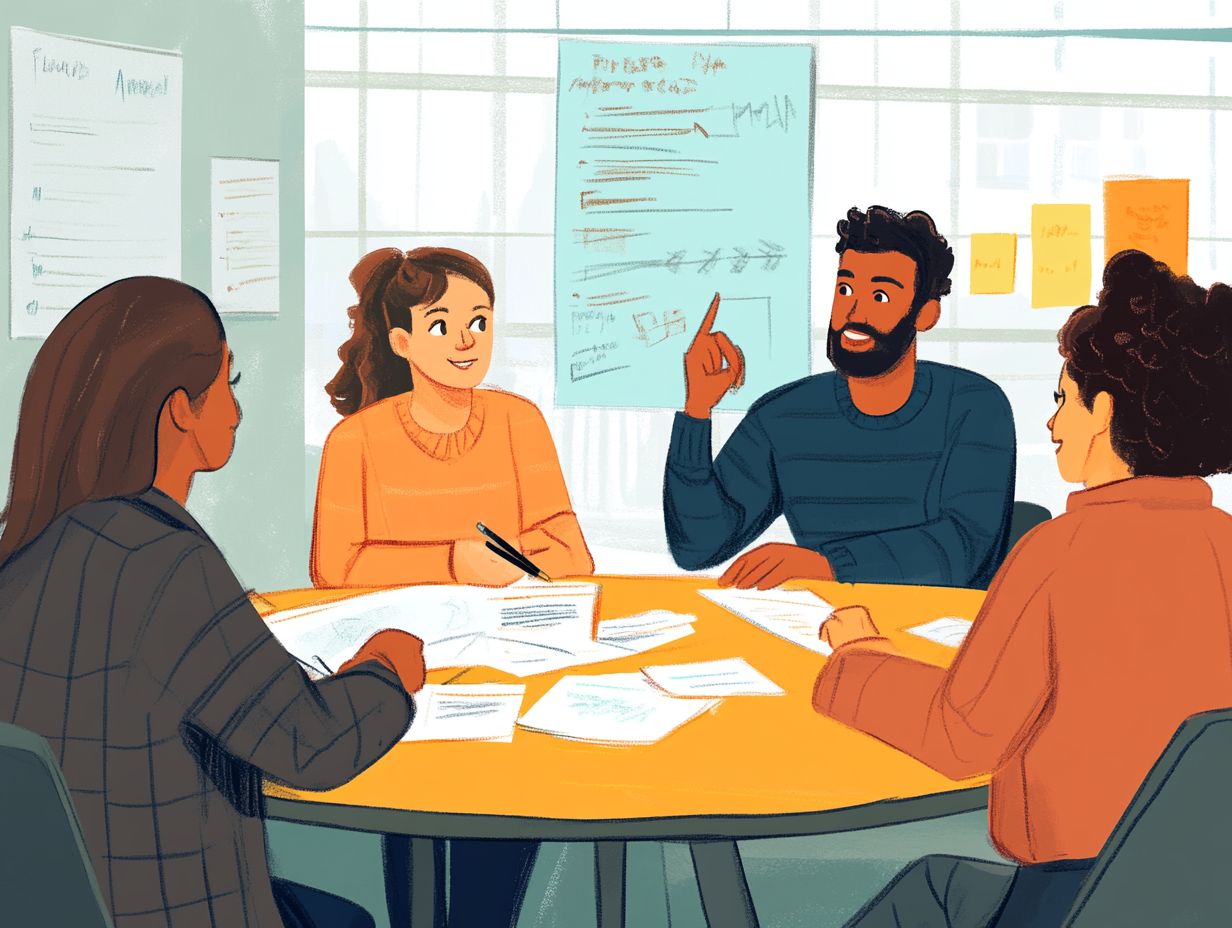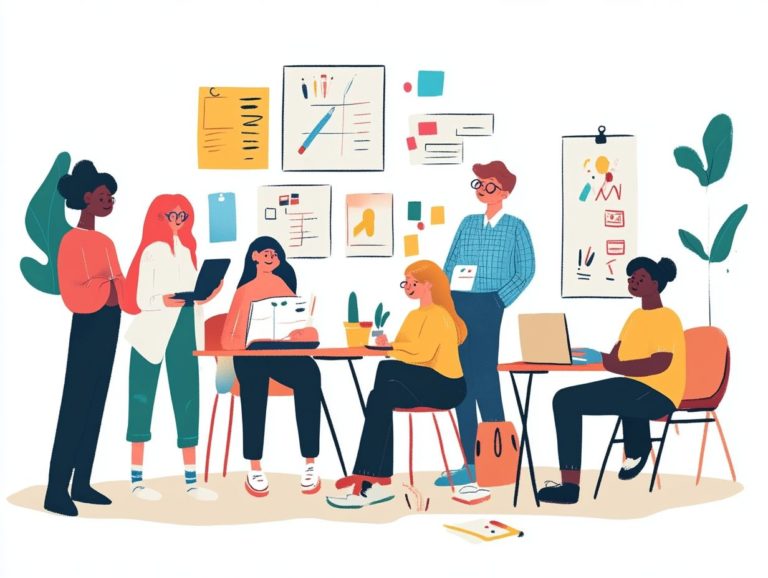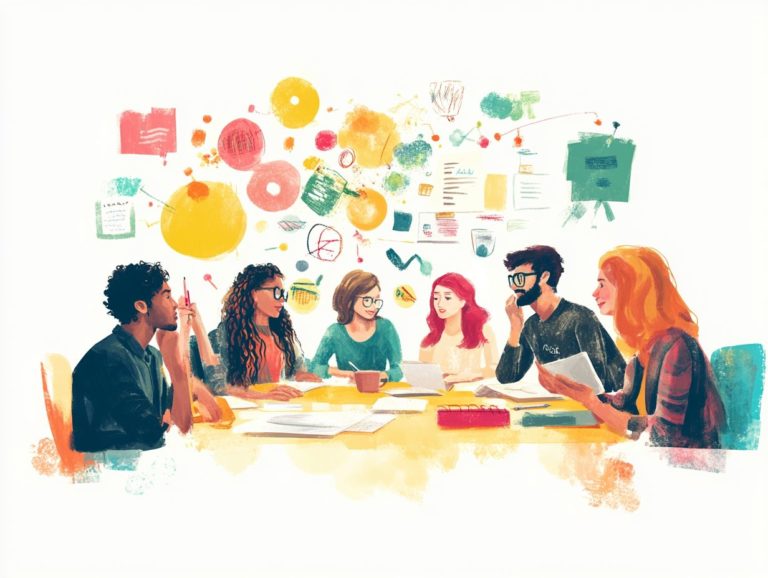The Role of Assessment in Skill Development
In today s fast-paced world, skill development is more essential than ever. Whether you re focusing on personal growth, pursuing education, or striving for excellence in the workplace, refining your abilities can open doors to greater opportunities and success.
But how can you effectively measure and enhance these skills? This article delves into the crucial role of assessment in skill development, providing insights into various types of assessments, effective strategies for implementation, and the challenges you might encounter along the way.
By grasping these elements, you ll be better prepared to foster your growth and navigate your learning journey with confidence.
Contents
- Key Takeaways:
- The Importance of Skill Development
- What is Assessment?
- The Role of Assessment in Skill Development
- Types of Assessments for Skill Development
- Effective Strategies for Using Assessment in Skill Development
- Challenges in Skill Development Assessments
- Frequently Asked Questions
- What is the role of assessment in skill development?
- Why is assessment important in skill development?
- How does assessment contribute to effective skill development?
- What are some common types of assessments used in skill development?
- Can assessments be used to measure both hard and soft skills?
- How often should assessments be conducted in skill development?
Key Takeaways:

- Skill development is crucial for personal and professional growth.
- Assessment is a tool used to evaluate and enhance skill development.
- Formative and summative assessments, along with effective strategies, aid in setting goals, tracking progress, and overcoming challenges.
The Importance of Skill Development
In today s swiftly changing workplace, the significance of skill development truly cannot be overstated. It directly impacts your skill set, addresses existing gaps, and plays a crucial role in enhancing retention rates.
Organizations are increasingly aware that investing in their workforce through comprehensive development programs not only cultivates competence but also nurtures a culture of continuous learning and improvement.
Focusing on skill development improves job satisfaction and retention rates among employees, resulting in a more competent and adaptable workforce. This commitment translates into better performance evaluations and supports your career growth, ultimately equipping you with the necessary skills to tackle both current and future challenges effectively.
Why Developing Skills is Essential
Developing skills is crucial for you and your organization; it ensures effective hiring decisions while boosting overall employee engagement. This, in turn, leads to higher productivity and morale.
Skill assessment is an important part of this journey, allowing you to identify the specific cognitive (thinking and problem-solving), soft (like communication), and hard skills (specific technical abilities) necessary for various positions. By gaining insight into the skill gaps within your workforce, you can design targeted training programs that not only elevate individual capabilities but also cultivate a culture of continuous learning.
By prioritizing skill assessment, your organization will gain a competitive edge, fostering innovation and driving sustainable growth in an ever-evolving market landscape.
What is Assessment?
In the realm of skill development, assessment embodies a meticulous process through which you evaluate employee skills and competencies. This approach allows you to pinpoint strengths and identify areas ripe for improvement, ultimately enhancing the potential of your workforce to its fullest.
Defining the Concept
Defining skill assessment means grasping its purpose, methodologies, and the significant value it brings to organizations eager to enhance employee skills and competencies.
One popular methodology is skill mapping, which visually depicts the skills you possess compared to those required for your role or potential advancement. This approach not only showcases your current capabilities but also uncovers gaps that can be filled through training and development.
For instance, imagine a technology firm utilizing skill mapping to identify employees who shine in programming yet lack project management skills. By offering targeted workshops, organizations can leverage your strengths while addressing weaknesses, ultimately cultivating a more competent and versatile workforce.
Incorporating industry insights and benchmarks provides a clearer perspective on where you stand in relation to market demands, ensuring that development efforts are in sync with organizational goals.
Ready to enhance your skills and gain a competitive edge? Start your skill assessment journey now!
The Role of Assessment in Skill Development

The role of assessment in skill development is crucial, acting as a cornerstone for employee growth. It enables organizations to pinpoint learning opportunities and facilitates skill enhancement through tailored interventions.
By embracing this process, you ensure that your team continuously evolves and thrives in an ever-changing landscape.
How Assessment Can Enhance Skill Development
Assessment can significantly enhance your skill development by providing a clear roadmap for improving cognitive skills, soft skills, and hard skills. Cognitive skills refer to mental abilities, soft skills involve interpersonal attributes, and hard skills are specific, teachable abilities. This ensures you receive tailored support throughout your learning journey.
By strategically utilizing assessments, organizations can pinpoint individual strengths and weaknesses, enabling the creation of focused training programs that truly meet their needs. For example, cognitive assessments might uncover gaps in analytical thinking, paving the way for targeted workshops designed to sharpen critical reasoning abilities.
Similarly, evaluating soft skills, such as communication and teamwork, can lead to interactive group exercises that nurture collaboration and empathy among team members. On the flip side, assessments measuring hard skills like technical proficiency in software or machinery can guide specialized training sessions that boost competency and confidence in specific tasks.
Combining these insights fosters a holistic approach to development, ensuring that your learning experience is both relevant and impactful.
Types of Assessments for Skill Development
You ll encounter a variety of assessments designed for skill development, which can generally be divided into two categories: formative assessments and summative assessments. Each type plays a distinct role in the learning journey, serving unique purposes that enhance your educational experience.
Formative Assessments
Formative assessments are important in your ongoing journey of skill enhancement, providing the means to identify learning opportunities and make real-time adjustments to training programs.
Assessments focus on continuous feedback, allowing your teams to receive timely insights into their performance. This feedback not only pinpoints areas needing improvement but also celebrates achievements along the way, nurturing a growth mindset among employees.
By regularly tracking development, you create a clear pathway for both individual and collective success. Formative assessments foster a culture of continuous learning, enabling employees to take ownership of their growth. This creates a collaborative environment where constructive dialogue flourishes, leading to more effective outcomes and ultimately driving the overall success of your organization.
Summative Assessments
Summative assessments offer a thorough evaluation of skill levels and competencies, usually conducted at the conclusion of a training program or project to gauge overall effectiveness.
These evaluations are essential in shaping future training initiatives, as they spotlight individual performance while revealing insights into team dynamics and organizational needs. By analyzing the outcomes, you position yourself to identify skill gaps and prioritize areas for improvement, effectively aligning training efforts with your strategic goals.
This approach uses real data to create an exciting culture of constant learning where everyone can thrive! The insights you gain will serve as a robust foundation for informed talent management practices, ensuring that the right individuals are ready to step into leadership roles in the future.
Effective Strategies for Using Assessment in Skill Development

By implementing effective strategies for assessment in skill development, you can significantly enhance your employee development initiatives. This approach ensures that feedback mechanisms and progress tracking become integral components of the learning process, fostering an environment where continuous improvement thrives.
Act now to integrate assessments into your skill development strategies and watch your team grow!
Incorporating Feedback
Incorporating feedback into your assessment process is key to fostering ongoing improvement that excites and engages everyone involved! It significantly enhances both performance evaluations and employee engagement.
When evaluations are paired with thoughtful, constructive feedback, you provide employees with clear guidance on areas for improvement. This approach also makes them feel valued and recognized for their contributions. For instance, when a manager emphasizes specific strengths alongside areas for growth, team members walk away from the conversation feeling motivated rather than disheartened.
Utilizing structured methods like the ‘sandwich method’ where positive feedback is nestled between constructive criticism can foster a more supportive atmosphere. These practices improve skill assessments and boost morale, creating an environment where employees feel enabled to thrive and excel in their roles.
Setting Goals and Tracking Progress
Setting clear goals and effectively tracking your progress are essential for successful skill enhancement. This approach allows you to measure your development and adjust strategies when necessary.
Utilizing structured goal-setting frameworks, like SMART goals which are clear goals that are Specific, Measurable, Achievable, Relevant, and Time-bound enables you to create objectives that will guide you toward realizing your potential. For example, if you’re aiming to enhance your project management skills, you might set a SMART goal to complete a certification course within six months while documenting your progress weekly.
Implementing tracking tools such as performance dashboards or progress charts allows you to visually monitor these objectives over time. This not only fosters accountability but also provides valuable insights into your engagement and areas where you might need support.
With this structured approach, both you and your team can truly thrive within the organization.
Challenges in Skill Development Assessments
While assessments are undeniably invaluable for your skill development, you must navigate a range of challenges and considerations. These include biases and limitations that could impact the fairness and accuracy of the results.
It’s essential to approach this process with a discerning eye, ensuring that the insights gained truly reflect your capabilities and potential.
Addressing Biases and Limitations
Addressing biases and limitations in skill assessments is essential for maintaining accuracy and ensuring that evaluations genuinely reflect employee competencies.
When skill assessments are influenced by subjective judgments or cultural biases, they can create unequal opportunities within the organization. This not only stifles individual potential but also undermines overall team performance and the organizational culture.
By implementing standardized evaluation criteria and utilizing diverse evaluation panels, you can effectively minimize the impact of these biases. Additionally, providing training aimed at recognizing and countering implicit biases can cultivate a more inclusive environment.
Ultimately, these strategies contribute to broader organizational equity initiatives, ensuring that every employee is assessed fairly and equipped with the tools they need to thrive.
Ensuring Fairness and Accuracy

Ensuring fairness and accuracy in skill assessments is essential for building trust and transparency, which ultimately leads to more effective evaluations of employee skills.
These assessments should include a range of methods, such as standardized testing and performance-based evaluations, to provide a well-rounded view of an individual s capabilities. By employing diverse evaluation techniques, you can address various learning styles and cultural backgrounds, creating a more inclusive assessment process.
It s crucial to regularly review and update these evaluation methods to keep them relevant and effective. This holistic approach not only boosts the legitimacy of the assessments but also enables employees, instilling confidence in the evaluation system as a fair measure of their skills.
Watch the video above to learn more about the importance of assessments in skill development.
Frequently Asked Questions
What is the role of assessment in skill development?
Assessment measures your current skill level. It also pinpoints where you can improve.
Why is assessment important in skill development?
Assessment sets a clear benchmark for your growth. It guides you in recognizing strengths and weaknesses.
How does assessment contribute to effective skill development?
Feedback from assessments directly enhances skill development. This feedback helps tailor your training to meet specific needs.
What are some common types of assessments used in skill development?
Common assessment types include self-assessment, peer assessment, and standardized tests. Each serves a unique purpose.
Can assessments be used to measure both hard and soft skills?
Absolutely! Assessments can measure hard skills, like technical abilities, and soft skills, like communication.
How often should assessments be conducted in skill development?
How often should you assess skills? It varies based on individual or organizational goals.
Start assessing your skills today to unlock your potential!






